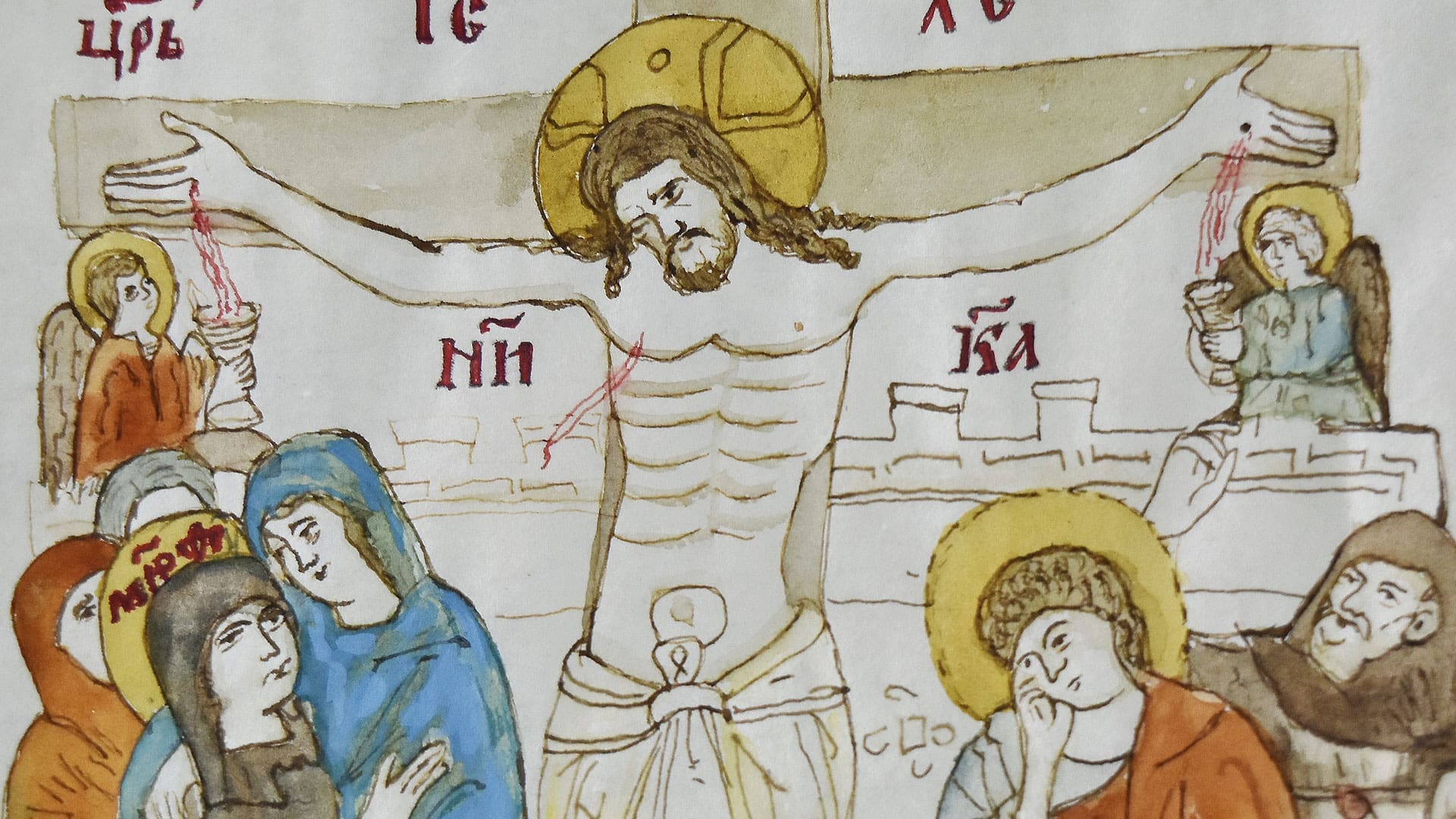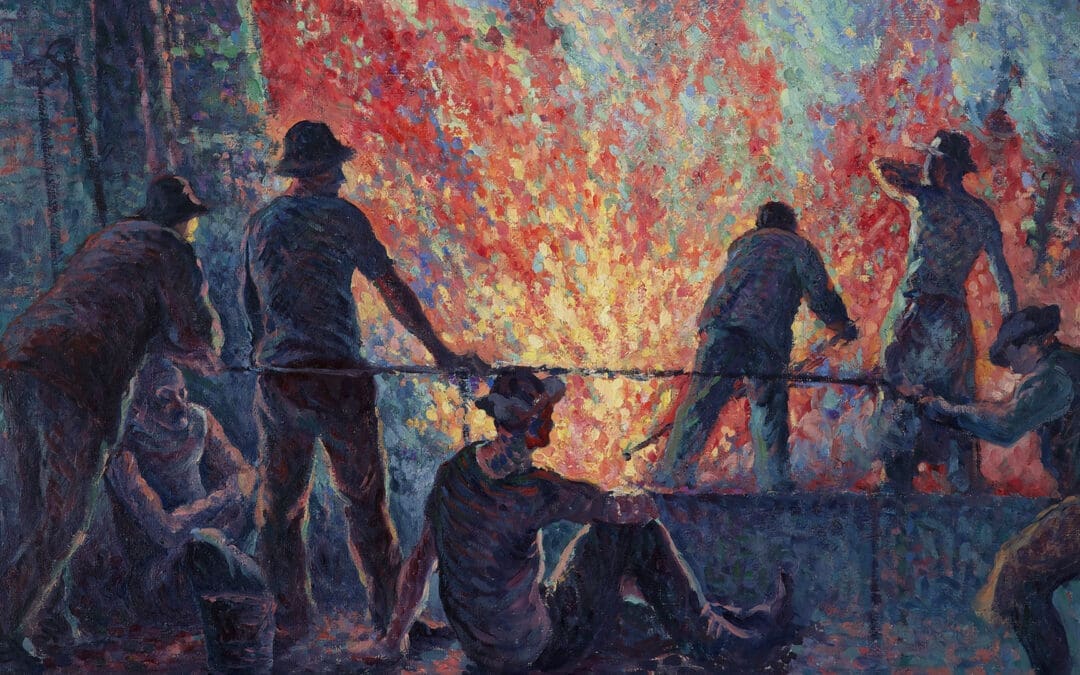G
Gratitude to God is at the heart of Christian faith and theology. One comes to see the specific character of Christian gratitude—or rather, of Christian talk about gratitude—through an examination of the role it plays within, and the shape it receives from, the doctrine of God. For the doctrine of God is not only of God but extends to all things in relation to God. What it means to speak of God truthfully thus bears directly on our understanding of creation, redemption, humanity, virtue, and the church. Gratitude becomes a sort of red thread common to these topics, descending from the heights into the nooks and crannies of our daily lives.
Tracing this thread, one sees the ways in which the fabric of Christian confession is interwoven with thanksgiving. But, to switch metaphors, the theological sequence unfolds less as a linear movement and more as a kind of nesting doll. Each in the series of topics—or perhaps concentric circles—highlights interrelated, ever-expanding insights that cumulatively amount to a Christian grammar of gratitude. Such a grammar is catholic, in the sense that its content is rooted in a tradition common to the one church stretching from the apostles to the present. To affirm this is not to deny that it is also contested, for the church’s history is rife with division and disputation over the meaning of grace, the question of merit, the significance of Eucharist. Family fights are rarely trivial, after all. We battle over what matters.
Gratitude matters. We see its heart in Christian teaching about the Triune God’s works of creation and redemption, culminating in the Lord’s incarnation, terminating in his death, and sustaining us in and through the sacraments of his life. Each of these works sheds light on what it means for Christians to speak of gratitude to God, and in turn opens out onto new angles from which to see the same reality afresh.
⎯⎯
The doctrine of creation from nothing (ex nihilo) is, in the words of John Webster, “a cardinal doctrine.” It has long served as a point of unanimous agreement among Christian theologians of every stripe. Its meaning might therefore be assumed to be self-evident or common knowledge, at least for believers today. But the doctrine itself is often misunderstood, and has come under fire in the last century. What then specifically does it teach, and why is it so important?
In simple form, it teaches that God creates all that is—all there ever was or will be—from nothing. God does not, that is, create from anything at all. God and only God, in Ian McFarland’s formulation, is “the sole antecedent condition” of the existence of anything that is not God: angels, humans, bacteria, dark matter, other universes (if they exist), this universe in its totality. God is, in Aristotelian terms, the single efficient, exemplary, and final cause of creation. As St. Thomas Aquinas puts it, “To create can be the action of God alone.”
This means, first, that God did not fashion the world out of preexisting materials; second, that matter is not itself eternal or coeval with God; third, that no other agent or principle served alongside God in the creative act; fourth, that God alone is sovereign over the created order; and fifth, that God is that to which all created being is ordered. “For from him and through him and to him are all things” (Romans 11:36), including ourselves. We are from him and for him; he and he alone is our source and end.
Creation ex nihilo is not, however, a doctrine about origins. It is a doctrine about the nature of created existence as such. If, contrary to fact, God had willed to create a universe without temporal beginning or end, such a universe would in fact still be ex nihilo, for the entirety of its being would depend, in every way and at every step, on the will and power of God its Creator. The doctrine, in short, is about the fact that there is and remains anything at all in existence that is not God, and how that can be, and why it is so.
Existence, on this understanding, is a gift so gratuitous that it lacks comparison with any created gift: it is sui generis, because it is the gift of being instead of not being. To exist, accordingly, is to be created: to be a creature, however great or small, is to depend at every moment on God as the infinite and inexhaustible source of one’s being; and to depend on God in this way is a fact to which creatures’ lives may be more or less transparent. For rational creatures, that transparency is found above all in gratitude; whereas ingratitude constitutes or reflects an opacity to God as one’s Creator. To live against the grain of dependence on God is finally self-denying: it is to stop up one’s mouth and nose in a vain search for alternative sources of oxygen. Whereas to live in grateful acknowledgement of God’s generosity in creating and sustaining oneself is by definition to flourish as a creature made from nothing.
In view of God as Creator and ourselves as creatures, therefore, gratitude to God is a special virtue, as Aquinas recognized. It properly orients us to the source and goal of our lives and disposes us to receive with open hands and hearts the manifold gifts bestowed on us so liberally by God. Such a disposition is well captured by David Kelsey’s term “doxological gratitude,” which he uses to characterize the proper response on the part of human persons to being the sort of creatures we are in the sort of world we inhabit. It further suggests, on the one hand, that prayer—here understood as thanksgiving to God made articulate by individuals and communities—must be central to an account of human flourishing; and, on the other hand, that gratitude to creaturely gift-givers be subordinate to, and analogously modelled on, gratitude to God.
Our lives are gifts and are constituted by gifts. Our happiness lies in gratefulness.
⎯⎯
God alone, as we have seen, creates from nothing. But God is not alone. He is the Holy Trinity, the eternal, irreducible, and unquenchable life of Father, Son, and Holy Spirit. The shape of creaturely gratitude to God follows not only from his action to create but also from his identity as Triune. Before saying how, let me begin with historic conciliar teaching regarding God’s Triune nature.
There is no God but the Trinity; the Trinity is the one true Lord of all. His life has no beginning or end, no source outside himself, no terminus other than his own replete beatitude. In the eternal generation of the Son from the Father and their unity in the Spirit who proceeds from the Father—the Spirit in turn uniting the Father and the Son in the love the Spirit is—the one Triune God exists from everlasting to everlasting in a glorious plenitude of joy and freedom at once perpetual in motion and unshakable in repose. He is, in a word, though in the highest and fullest sense of the word, happy.
The upshot for creatures is good but initially off-putting, at least for some: God does not need us. We do not, because we could not, add to his happiness. He is happiness itself. Just so, he is our happiness, for we do need him, and have no satisfaction apart from him. Hence the character of creaturely gratitude: “You have made us for yourself,” writes St. Augustine, “and our hearts are restless until they rest in you.”
That is the first reason why the unqualified happiness of Father and Son in the Spirit is good news. The second is the Trinity’s lack of codependence with us. We are not pawns in a game he is playing for sport. We are not props in a play put on for his arbitrary desire. We are not the stage or theatre of his own self-realization or divine becoming. (Creation is not theogony, a sort of origin story for deity; here, then, the doctrine of the Trinity meets and finds mutual support in the doctrine of creatio ex nihilo.) God is who he is, and he does not depend on us for his status, identity, power, or good pleasure. That means, in turn, that his sovereign will to be our God, to act for our good, to bless and to save—to reach out toward us in glorious self-donation—is absolutely unrestricted. For God to give of himself entails no loss on his part, and nothing but gain on ours. That is evident preeminently in our creation, and it is only confirmed in our salvation. Perfect in himself and hence perfectly happy, the Holy Trinity who creates from nothing is threatened by nothing, disbarred by nothing, to be for us and our well-being entirely, without restraint.
Consider the Lord’s epiphany to Moses, the paradigm of the divine self-disclosure as simultaneously God free from us and God for us. The condition of the Lord’s ability to deliver Israel from bondage to the gods of Egypt is precisely his antecedent identity as He Who Is—“I Am Who I Am” or “I Will Be Who I Will Be” in Exodus 3:1–22. Only the God invincibly secure in his being and power may sovereignly will to save those in need. This connection between God’s life in himself and our life in the world, moreover, raises a speculative question. Theologians use the term “exemplary cause” to name the fact that, at some level, everything in creation reflects or corresponds to its divine source. Does it follow that there is something like gratitude in the Holy Trinity?
Let us say that the Son just is gratitude hypostatized, which is to say, his identity as a distinct person is nothing but gratitude: all that he is, he receives from the Father; but what he is, he has in himself, for thus is the Father’s gift in begetting him (see John 5:26). For this reason the tradition has understood the Son as the archetype of creation, not because he is any less divine than the Father, but because his fromness serves as a pattern for bringing into being that which is not divine. Hence his second and third proper titles: He is the eternal Word of God (John 1:1–3), through whose being spoken forth in time the world is made (see Genesis 1:3); he is the Image of God (Colossians 1:15), and in imaging the Father exactly (Hebrews 1:3), he is God as the Father is God (see 1 Corinthians 8:6). Whereas creation generally, and human beings particularly, image the Image.
Thus while the “gratitude” of the Son to the Father simply names the shape of his hypostatic subsistence as Word and Image, our gratitude is modelled on his, albeit doubly so. God does not need our gratitude, but we rightly want our very being as creatures to be synonymous with gratitude to God; our fallenness, however, bespeaks a fracture between our desired and our actual modes of being—a fracture we can do nothing to repair ourselves. In this way our deepest flourishing depends on a living, embodied thanksgiving that amounts to an imitatio Dei, even as our sin turns us in on ourselves, congenitally ungrateful and unable, even where desirous of the virtues of religion and piety, properly to pay the debt we owe to the One who gives us life itself.
In the words of St. Paul in Romans 7:24, “Wretched man that I am! Who will deliver me from this body of death?”
⎯⎯
The apostle gives the reply in the next verse: “Thanks be to God through Jesus Christ our Lord!” For, as he says in 2 Corinthians 8:9, this is “the grace of our Lord Jesus Christ, that though he was rich, yet for your sake he became poor, so that you by his poverty might become rich.” Our creaturely gratitude, twisted and corrupted by sin, is now transformed and elevated by the wonders of forgiveness and deification. Expanding on this theme, St. Maximus the Confessor writes that “God took on himself [our nature] for our sake and thus renewed our nature, or better yet he created our nature anew, and returned it to its primordial dignity of incorruptibility through his holy flesh. . . . What is more,” he goes on, “he generously provided our nature with the gift of deification, which he could not possibly have failed to bestow since he was himself God incarnate, indwelling the flesh in the same manner that the soul indwells the body, that is, thoroughly interpenetrating it in a union without confusion.” Such seemingly spare metaphysical claims leave Maximus short of breath and grasping toward doxology: “And what could be more amazing than the fact that, being God by nature, and seeing fit to become man by nature, he did not defy the limits of either one of the natures in relation to the other, but instead remained wholly God while becoming wholly human?”
The incarnation is thus a mystery past recounting, a gift beyond measure. In it the uncreated Image of God becomes the creaturely image of God. “The Word became flesh and dwelled among us” (John 1:14). Or in the gloss of St. Athanasius, “He was humanized that we might be divinized,” an exchange Maximus calls “this blessed inversion.”
It follows that Jesus, as the incarnate Son, embodies gratitude to God in creaturely—wholly human—form. Indeed, because Jesus is very man and very God, the whole course of his life instantiates simultaneously the eternal intra-divine “gratitude” between Son and Father in the Spirit and the temporal gratitude proper to creatures in relation to the Creator. If, then, we want to know what gratitude looks like in a human life, we ought to look to Jesus, our exemplar and forerunner in this as in all the virtues.
But that is not the end of the story. Jesus is not merely Aristotle’s virtuous man or Paul’s second Adam. He not only lived a human life. He died a human death. And his death, the gospel proclaims, is saving: by his wounds we have been healed (1 Peter 2:24). To be—to learn to be—grateful to God entails, therefore, more than gratitude to God as the continuous gracious source of our very existence; it entails as well gratitude that God drew near and offered himself on the cross. “For God so loved the world that he gave his only-begotten Son . . .” (John 3:16 KJV).
In this way God’s love for us is inflected by his distinct modes of relation to us: creating us, reconciling us to himself, drawing us to eternal life with himself. The book of Psalms, wherein we hear the voice of Christ figuring his own passion and victory in advance, bears witness to this differentiated gratitude, full as it is of petition, complaint, lament, and thanksgiving. We are right to thank God for his gifts, in other words, but because his gifts are multiple and multifarious, we ought to thank him in different ways.
More broadly, we now see the wisdom of Karl Barth’s description of the relationship between grace and gratitude in the Christian life: “Grace and gratitude belong together like heaven and earth. Grace evokes gratitude like the voice an echo. Gratitude follows grace like thunder lightning.” Or, we might add, like a memory an event, or a meal a sacrifice.
⎯⎯
The love of God, writes Paul, is shed abroad in our hearts through the gift of his Holy Spirit (Romans 5:5). The Spirit’s works of love in the church we call sacraments. In the visible words of baptism and Eucharist, we at once see God’s love, receive his gifts of grace, and surrender ourselves in grateful submission to his will. No wonder the principal sacrament’s literal name is “Thanksgiving.” These corporate practices efficaciously mold and shape the members of Christ’s body across the course of their lives precisely in the sort of gratitude exemplified by Christ, into whose death and resurrection we are immersed, by whose body and blood we are nourished. And we learn gratitude first of all as a community, as a people defined by prayer. After all, how do children and catechumens learn to begin their prayers? They listen to the gathered assembly at prayer. And what do they hear? “O God, we give you thanks . . .”
So the church, as the corporate body of Christ fed by his sacramental body and drawn forward in time by his Spirit to the public manifestation of his risen body, is a community created and defined by gratitude to God. Indeed, the inception of the church is itself the occasion of a gift, the great giving of the Holy Spirit at Pentecost (see Acts 2). The Spirit who indwells the church and animates its life through word and sacrament bears the personal name of Gift, as Augustine recognized long ago. The singular Gift with which the Father presents the Son, thus eternally begetting him as the Son through the eternal breathing-forth of the Spirit on him, is one and the same as that which is poured out on the apostles during the great feast in Jerusalem, granting new life to the Son’s reconstituted body and holy Breath to the living temple of God—one not made with human hands (see 1 Corinthians 3:16–17; 6:19–20; Acts 7:48).
The shape of this community’s life is eucharistic from start to finish. It breaks bread in grateful memory of the Author of life (see, e.g., Acts 2:37–47), who died and rose again to grant eternal life to all who call on his name (3:15; 4:12). It offers itself to God on behalf of the world, and to the world on behalf of God. The source and summit of its life is gratitude in all its forms: Christ the hypostatic gratitude of God; Christ gratitude incarnate; Christ the human exemplar of gratitude; Christ the debt of gratitude paid to God; Christ the bread of gratitude offered and eaten on the altar; Christ the Spirit of gratitude shed abroad in the hearts of the faithful.
It turns out that, in searching for a Christian grammar of gratitude, the name of Christ is convertible with all our terms. His incarnation is indeed, in the formulation of Maximus, that “mystery for which and through which all . . . other things took place.” To speak well of gratitude to God, we need only speak well of Christ. Looking to him, we see all things, for in him “are hid all the treasures of wisdom and knowledge” (Colossians 2:3 RSV). Paul goes on: having “received Christ Jesus the Lord,” we therefore “live in him, rooted and built up in him and established in the faith” (vv. 6–7). The result: “overflowing with thankfulness” (v. 7 NIV).
To abide in Christ is to abide in gratitude. Receiving him, we receive everything (see 1 Corinthians 3:21–23); for what do we have that we did not receive (4:7)? It is all gift. And in the face of such a gift, our thanksgiving abounds all the more.



